The Samsung 860 QVO (1TB, 4TB) SSD Review: First Consumer SATA QLC
by Billy Tallis on November 27, 2018 11:20 AM ESTAnandTech Storage Bench - Heavy
Our Heavy storage benchmark is proportionally more write-heavy than The Destroyer, but much shorter overall. The total writes in the Heavy test aren't enough to fill the drive, so performance never drops down to steady state. This test is far more representative of a power user's day to day usage, and is heavily influenced by the drive's peak performance. The Heavy workload test details can be found here. This test is run twice, once on a freshly erased drive and once after filling the drive with sequential writes.
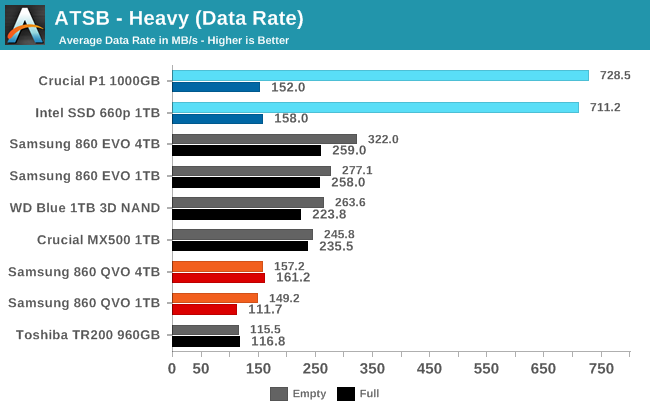
Neither capacity of the Samsung 860 QVO can keep pace with the mainstream TLC drives on the write-intensive Heavy test, but they both outperform the DRAMless TLC drive. The NVMe+QLC drives from Intel and Micron fare much better when the test is run on an empty drive, but when full they too fall behind the mainstream TLC SSDs.
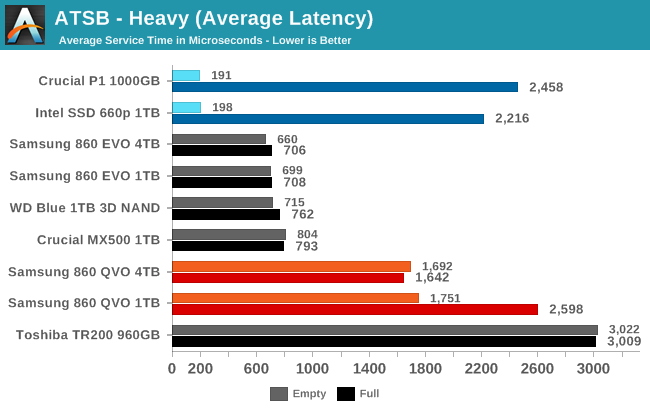
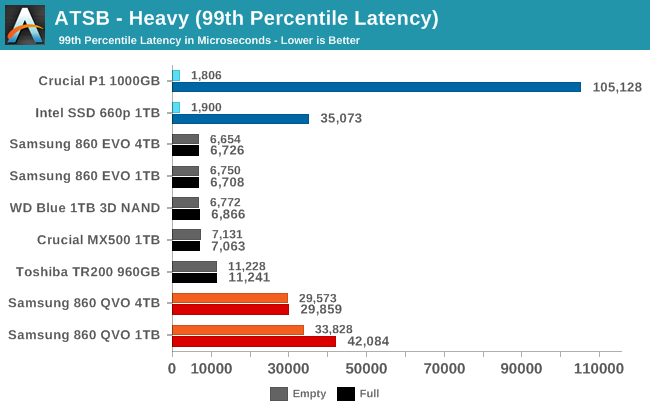
The Samsung 860 QVOs have much worse latency scores than the mainstream TLC drives, and the 99th percentile latency is much worse than even the DRAMless TLC SSD. However, the Samsung QLC drives are a bit better than the Intel/Micron QLC drives at keeping latency under control when the test is run on a full drive.
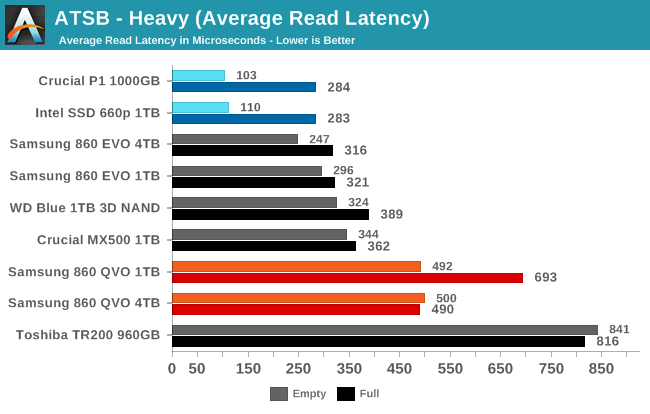
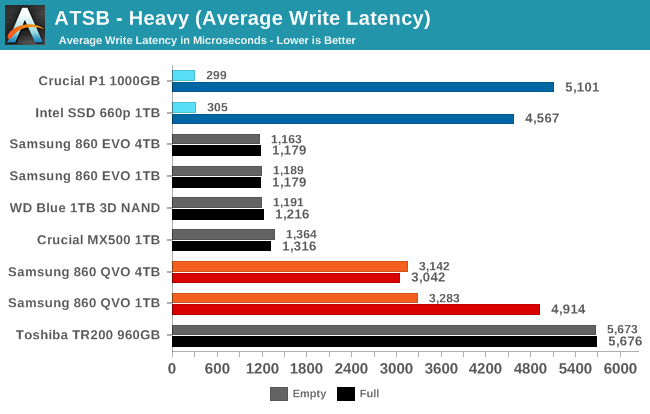
The average read latencies from the Samsung 860 QVOs are only a bit higher than the mainstream TLC drives, but the average write latencies stand out as worse by at least a factor of two.
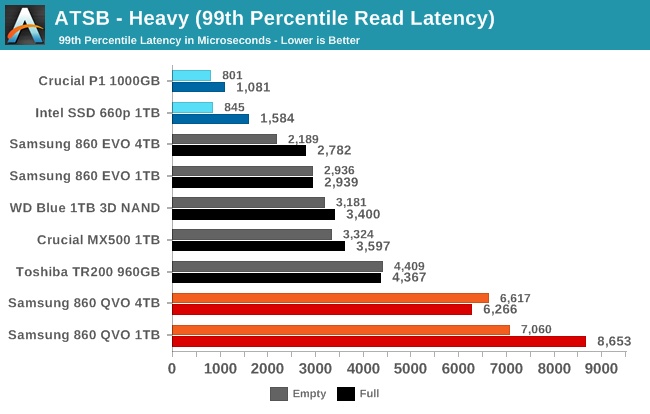
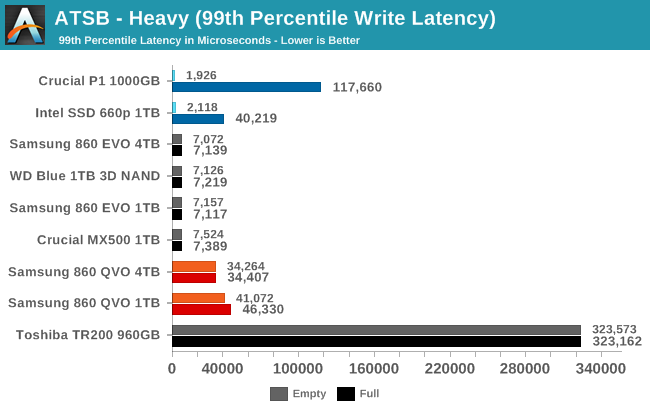
The 99th percentile read and write latency scores from the 860 QVOs are poor, but they at least avoid the horrific write QoS issues that the Toshiba TR200 shows, and are better than the full-drive run on the Crucial P1.
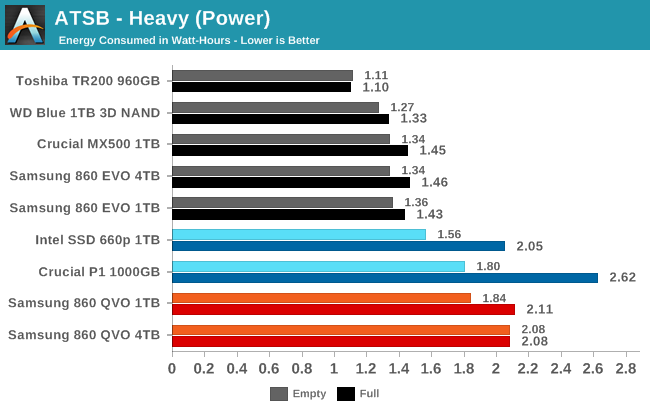
The Samsung 860 QVO uses substantially more energy over the course of the Heavy test than the other SATA drives, and more than the the NVMe QLC drives in most cases, too.










109 Comments
View All Comments
R0H1T - Wednesday, November 28, 2018 - link
>moozoohQVO is the first SATA QLC drive, so yeah first of it's kind unless we're being pedantic. As for the price ~ it should & will likely come down soon enough.
>Right now there is exactly zero reason to choose it over the EVO.
The 500GB EVO costs about $130 US where I'm from, there's very little incentive for me to buy it given the "inflated" price.
moozooh - Wednesday, November 28, 2018 - link
> "QVO is the first SATA QLC drive, so yeah first of it's kind unless we're being pedantic."The fact that it's the first or the only doesn't matter to anyone who's buying things based on anything resembling a performance/price ratio. It's the first to be inferior to an already existing product. Who would be the early adopter of something that's clearly worse than something else that costs more or less the same?
> the price ~ it should & will likely come down soon enough
So why didn't Samsung recommend a lower price to begin with, considering how badly this products needs it? I'm sure they follow the market close enough to see this series competes with their own EVO (and loses hands-down).
> The 500GB EVO costs about $130 US where I'm from, there's very little incentive for me to buy it given the "inflated" price.
Yet this makes the QVO more attractive for you, especially considering it doesn't even feature a 500 GB model? I don't understand your argument. The point is this drive needs to be much, much cheaper than the EVO to be attractive at all. The downsides of the QLC NAND are numerous and significant; they need to be offset using the price. It's also clear this is where the multi-bit madness should end, because QLC is already encroaching onto the HDD territory in certain aspects (except the price, sadly) and scenarios. If PLC were a thing, I'd most likely stay away from it even if it were cheaper than hard drives. That's just asking for trouble, like those glass platters in IBM's Deskstar 75GXP (one of the most disastrous HDD series of all time).
R0H1T - Wednesday, November 28, 2018 - link
>The fact that it's the first or the only doesn't matter to anyone who's buying things based on anything resembling a performance/price ratio.The fact is you quoted me when I said first of a kind, which holds true for this drive, end of!
>So why didn't Samsung recommend a lower price to begin with, considering how badly this products needs it?
I dunno, how about you ask Samsung why didn't they sell the 860 EVO for $130 at launch?
>Yet this makes the QVO more attractive for you, especially considering it doesn't even feature a 500 GB model?
Yes because the QVO model, when it launches here, should be cheaper ($/GB) than the EVO drives. It's not like I can't afford $130 drive, but the 1TB or 2TB would be better VFM for me, considering I'm looking to replace some HDDs permanently. The EVOs would probably still be 40~60% more expensive.
moozooh - Wednesday, November 28, 2018 - link
> The fact is you quoted me when I said first of a kind, which holds true for this drive, end of!Once again, the fact that I'm pointing out is that it is a non-argument. Early adopter premium only exists for something that such an early adopter would want to have NO MATTER THE COST. Such as a new feature or better performance with existing features. Here, the cost is the ONLY thing an early adopter would want about it and the only potential advantage, period. Why do you not see how you're not making sense? "One of a kind" is an idiotic argument to use for the product that's intended to be cheaper, not better.
> I dunno, how about you ask Samsung why didn't they sell the 860 EVO for $130 at launch?
They launched the 860 EVO at the same time with the 860 Pro with a significant enough difference in MSRP that one didn't cannibalize the other, and the EVO was also fast enough to overtake most of the competition widely available at that price point. So the pricing made sense at the time, not so much here.
> The EVOs would probably still be 40~60% more expensive.
Hopefully so, but Samsung's lack of aggression and insight in undercutting their own existing product is disappointing. They are well aware of the going price of the EVO.
R0H1T - Wednesday, November 28, 2018 - link
>moozoohWe're forgetting arguably the most important thing ~ yields. There were some (unconfirmed) reports that QLC yields were below par, so it's quite possible that these products being priced so close to TLC drives is a result of that.
moozooh - Wednesday, November 28, 2018 - link
I don't really think yields are important. It's not an attribute for customer to base their decisions on, it's not something that can be tested or seen, and needn't be either—it's the manufacturer's problem. After all, customers aren't altruists and aren't out there to help Samsung or any other vendor do their business—what they need to care about is that the products they buy are priced fairly. Samsung won't convince anyone to overpay for QLC because the yields are too low to justify a fair price.Two possible ways to handle this launch better would be either to bite the bullet and suggest a sensible MSRP from the get go or stabilize the technology before coming out with the product and selling it at a healthy margin. Either way there won't be many people buying this until it's sufficiently cheap so the difference isn't as big as it might feel.
FullmetalTitan - Thursday, November 29, 2018 - link
'Yields don't matter to initial consumer product pricing' is a pretty spicy take.It doesn't matter whether the consumers want to be altruistic (definitely not the correct usage here), this is the price if you want high density SSD storage in a single unit, like it or not. You clearly don't, so kindly shut up and move on.
Manch - Wednesday, November 28, 2018 - link
If the 500GB EVO is double the going price in your area, what makes you think the 860 QVO won't be?Me thinks, you've dug a hole. Stop digging LOL
R0H1T - Wednesday, November 28, 2018 - link
>double the going priceDouble the what? Do you know the price 860 EVO debuted in every country of the world, now can you guess the price QVO would retail for?
How about you stop assuming $130 US (1TB) is the normal EVO price everywhere around the world? Then stop reaching.
s.yu - Saturday, December 1, 2018 - link
If you're knowingly buying from an expensive source, you're buying it wrong. If you insist on buying it wrong, then stop wasting other people's time with your BS.Time to hit eBay, nowadays Taobao may help.